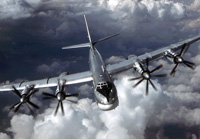Canada does not like Russian nuclear bombers patrolling Arctic territory
Canada’s Prime Minister Stephen Harper initiated a demonstrative international scandal less than 24 hours before Barack Obama’s visit to the country. Harper accused Russia of its aggressive actions in the Arctic after Moscow sent its Tu-95 strategic bomber plane close to Canada’s Arctic borders.

Moscow said that the bomber did not transgress any borders and described Ottawa’s surprising statement as ‘farce’. Farce usually designates something cynical and hypocritical in politics. The chairman of the Canadian government accused Russia of aggression as he was probably looking for a reason to justify the expansion of his nation’s military presence in the Arctic region.
"I have expressed at various times the deep concern our government has with increasingly aggressive Russian actions around the globe and Russian intrusions into our airspace. This government has responded every time the Russians have done that. We will continue to respond; we will defend our airspace," the Canadian Prime Minister said.
As a matter of fact, the Canadian government has nothing to worry about.
“The Tu-95 strategic bomber, which took off from Russia’s Engels Air Base, conducted a scheduled sortie in accordance with the plan to patrol the Arctic latitudes. The flight of the Russian aircraft took place strictly in accordance with the international flight rules, and there was no intrusion of Canada’s air space made. The neighboring states have been notified of the flight in advance,” Alexander Drobyshevsky, an official spokesman for the Russian Defense Ministry said in a statement.
It is worthy of note that there are territories on our planet, which sovereign states control and there are other territories, which no one controls. The biggest part of the World Ocean refers to the second category, with the exception of territorial waters. The international law acknowledged the right of the states to control their coastal waters, whereas the open sea is the open territory for everyone.
Major naval powers always endorsed the free seas principle just because of the fact that their navies command the oceans. The international law does not stipulate sovereignty over the ocean, which means that problems, if they emerge, will be solved militarily. Patrolling the air space is one of the measures that sovereign states can take to be prepared for a military action. This is exactly the reason why Russia patrols its Arctic airspace. Russian actions are absolutely legal at this point, but they somehow irritate the USA and Canada.
The nervous reaction of the Canadian government is connected with the growing competition for the Arctic region. The region concentrates about 90 billion barrels of crude and 47 trillion cubic meters of natural gas. The Arctic continental shelf may hold up to a quarter of all shelf reserves of hydrocarbons in the world, as well as gold, nickel and diamonds. The unexplored reserves of hydrocarbons deposited in Russia’s potential water area are evaluated at 9-10 billion tons of equivalent fuel. That is why the Arctic states are so determined to expand their continental shelves.
Russia’s Arctic territory lies in the Arctic Ocean, as well as in the Sea of Okhotsk and in the Barents Sea. The Arctic region already provides about 11 percent of Russia’s national income and 22 percent of the entire Russian export. Russia mines 90 percent of nickel and cobalt in the region, along with 60 percent of copper, platinoids, 100 percent of barium sulphate and apatite concentrate. The Russian Arctic territory holds more crude than in all OPEC countries do altogether.
Apparently, Canada does not like it. The government of the country even said that it would be ready to spend billions of dollars on the protection of national interests in the Arctic. It just so happens that the flight of the Russian bomber became a wonderful, albeit a silly reason to substantiate Canada’s claims for a piece of the Arctic pie.
Vladimir Anokhin
Subscribe to Pravda.Ru Telegram channel, Facebook, RSS!




